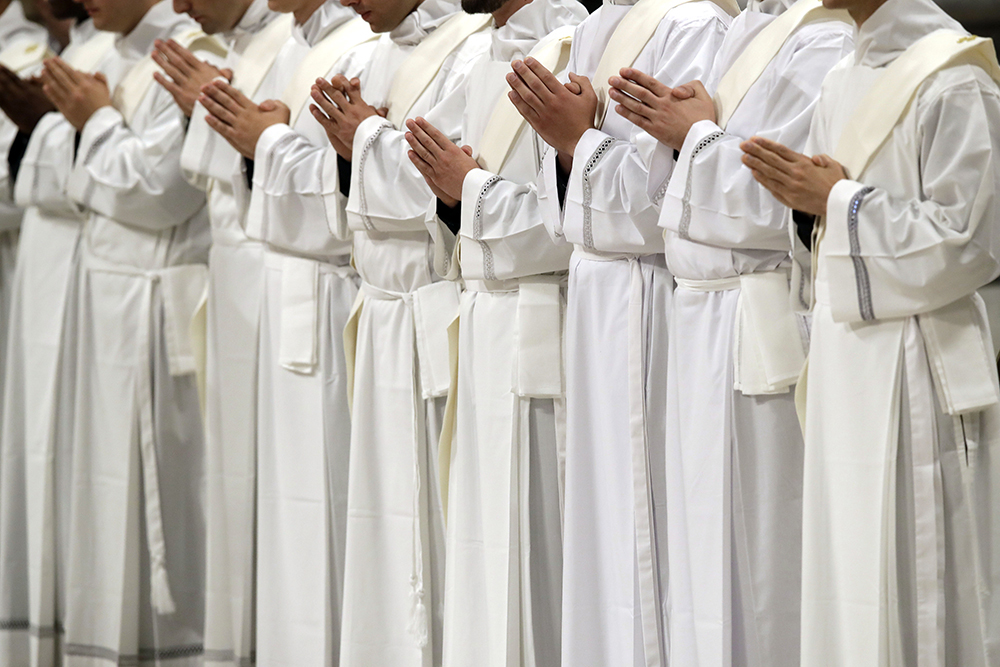
Newly ordained priests pray during a ceremony led by Pope Francis in St. Peter's Basilica at the Vatican on May 12, 2019. (AP/Alessandra Tarantino)
In an article in The Atlantic’s June issue titled "Abolish the Priesthood," James Carroll provides thought-provoking analysis of the state of the Catholic Church, recounting the history of the sex abuse crisis in the church with special focus on Boston, Ireland, the Pennsylvania grand jury report and Theodore McCarrick.
None of this is new, of course, but seeing it all together depresses and angers the reader that such things were possible in the church.
Also not new is the culprit, in Carroll’s eyes. He points to clericalism as "both the underlying cause and the ongoing enabler of the present Catholic catastrophe."
"Clericalism, with its cult of secrecy, its theological misogyny, its sexual repressiveness, and its hierarchical power based on threats of a doom-laden afterlife, is at the root of Roman Catholic dysfunction," according to Carroll. "The clerical system’s obsession with status thwarts even the merits of otherwise good priests and distorts the Gospels’ message of selfless love, which the Church was established to proclaim."
It was clericalism that soured Carroll on the church and led to his leaving the priesthood 45 years ago. Now he wants the priesthood abolished altogether.
Pope Francis has also pointed to clericalism as a cause of the church’s failures, but he is not spared in Carroll’s analysis. Carroll was scandalized by Francis’ claim during his August 2018 visit to Ireland that until then he knew nothing about the Magdalene laundries or their scandal. "Pope Francis is lying" was the thought that went through his head at the time. Now Carroll acknowledges that Francis may merely have been ignorant, but "to be uninformed about the long-simmering Magdalene scandal was just as bad."
Carroll claims that clericalism has its origins not in the Gospel, but in the attitudes and organizational structure of the Roman Empire. He, like many before him, sees the early Christians as part of a pure, loving, nonhierarchical community that was later corrupted by its alliance with Emperor Constantine.
While there is some truth in this theory, clericalism has deeper and earlier roots in the human condition. In Matthew 20, we hear of the mother of James and John asking Jesus to "Command that these two sons of mine sit, one at your right and the other at your left, in your kingdom."
That this was not simply her idea is made clear by Matthew telling us that "When the ten heard this, they became indignant at the two brothers."
And Mark 9 tells us that Jesus had to chastise the Apostles for arguing about who was the greatest among them.
Clericalism was already present among the Twelve long before Constantine.
Nor did Pentecost cure the Apostles of their clericalism. According to Acts 6, deacons came into existence because the Twelve thought they were above waiting on tables. "It is not right for us to neglect the word of God to serve at table."
Clericalism is simply the manifestation in the church of very human temptations that are present in every organization: ambition, pride, arrogance and the abuse of power. We are just shocked to find it in the church.
This is why abolishing the priesthood will not save the church. As in every revolution, there will be a period of euphoria followed by chaos and then a new cadre will replace the old guard. We see this happen time after time in both the religious and political world.
Those who believe that democratic procedures will break this cycle have never been to a contentious parish meeting. Nor can they explain why democracy, which is working so badly today in the United States and the rest of the world, will magically work well in the church. Remember, half of Catholics voted for President Trump.
In earlier columns, I have written extensively on the need for structural reform in the church. I favor optional celibacy for Catholic priests and women priests. It might even make sense to separate the cultic priesthood from administrative power in the church.
But Francis is correct that only a fundamental change in attitudes and church culture will save the church. This is not easy, but calls to conversion are at the core of the Gospel message. It is what the church is supposed to be all about.
Advertisement








